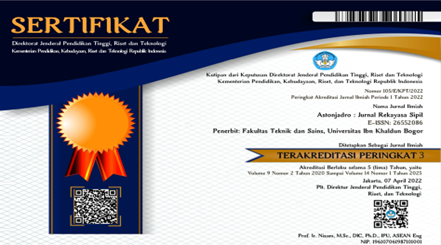The Analysis of Changes in Calorific Value of Coal in the Coal Flow Coal Feeder and Net Plant Heat Rate (NPHR)
DOI:
https://doi.org/10.32832/astonjadro.v14i1.18136Keywords:
coal calories; NPHR; moisture content; coal flow; efficiency.Abstract
This study to determine the effect in the difference of coal calori value on power plants. Currently, coal-fired power plants dominate power plants in Indonesia with 42.38%. With the dominance of coal-fired power plants, the need for coal in Indonesia remains high. In the electricity production process, calori value is an important in the electricity production process. This study discusses the effect of coal on power plants. In this study, coal received two types of treatment, namely by heating with sunlight and oven. Then in this study, research was conduct on the calori value of coal on several parameters such as Specific fuel consumption (SFC), coal flow, boiler efficiency and NPHR. From the results of the research conduct, the drying process in the sun for 10 days can reduce the water content by 28% and reduce the weight of coal from 150 grams to 108 grams. Changes in calories due to a reduction in the water content value in coal by 28% to 5414 kcal / kg. In the coal combustion test, the calorific value of coal is inversely proportional to the NPHR value and coalflow of the PLTU.
References
Alfonso Nainggolan Program Studi Teknik Elektro Sekolah Tinggi Teknologi Pekanbaru Jl Dirgantara No, S., Tim, S., Marpoyan Damai, K., & Pekanbaru, K. (2021). Analisa Peningkatan Nilai Net Plant Heat Rate (NPHR) pada Unit 1 PLTU Tenayan 2 x 110 MW. 8(1), 259–264.
Ariyanto, A. E., & Soekardi, C. (2023). PLTU MERAK ENERGI INDONESIA. Jurnal Teknik Mesin, 12(3), 216.
AUDIT ENERGI DETAIL PADA PLTU BATUBARA DENGAN. (n.d.).
Biaya, M., Bakar, B., Suriyan, P., Wibowo, A., & Windarta, J. (2020). Pemanfaatan Batubara Kalori Rendah Pada PLTU untuk. 1(3), 100–110. https://doi.org/10.14710/jebt.2021.10029
BUKU SAKU. (n.d.).
Dafa Arifki, R., Ghony, M. A., & Belatri, N. (n.d.). Bidang: Teknik dan Analisis Kimia Mineral Topik: Kimia Analisis, Kimia Mineral & Kimia Terapan PERBANDINGAN METODE BS TERHADAP METODE ASTM DALAM ANALISIS PROKSIMAT BATUBARA.
Kumar, P., & Kumar Nandi, B. (2021). Combustion characteristics of high ash Indian coal, wheat straw, wheat husk and their blends. Materials Science for Energy Technologies, 4, 274–281. https://doi.org/10.1016/j.mset.2021.08.001
Lingkungan, J. R., Ardinata, S., Herniti, D., & Pranajati, A. (n.d.). Analisis Proksimat Batubara Menggunakan Standar Astm Pada Pt. Cahaya Bumi Perdana Kabupaten Sawahlunto Provinsi Sumatera Barat.
Marlina, R., Pelita, R., Pertambangan, T., Tinggi, S., & Padang, T. (2019). Model Coal Blending Beda Kualitas Untuk Memenuhi Permintaan Buyer. Jurnal Sains Dan Teknologi, 19(1).
Niu, J., Jia, J., Zhang, H., Guo, Y., Li, L., & Cheng, F. (2023). Insights on the dual role of low-rank coal with high mineral catalysis index (LRC-HMCI) during blending coal for activated carbon production and low-temperature NH3-SCR of NO. Fuel, 349. https://doi.org/10.1016/j.fuel.2023.128591
Pengaruh, A., Batubara, K., & Nugroho, A. A. (2014). Analisa Pengaruh Kualitas Batubara Terhadap Biaya Pembangkitan (Studi Kasus Di Pltu Rembang). Media Elektrika, 7(1).
Pengaruh Jumlah Plugging Tube High Pressure Feedwater Heater Terhadap Efisiensi Pltu 400 Mw. (n.d.).
Wahyono, Teguh HM ., Konversi, T., Jurusan, E., Mesin, T., Semarang, P. N., Teknik, J., Politeknik, M., Semarang, N., & Sudarto, J. H. (2015). Penggunaan Mix Coal Terhadap Efisiensi Pembangkit Dan Biaya Produksi Listrik (Bpl) Di Pltu Tanjung Jati B Unit 3 Jurnal Teknik Energi (Vol. 11, Issue 2). http://www.polines.ac.id,
Putra, Y. R., Harminuke, R., Handayani, E., Syarifuddin, D., & Pertambangan, J. T. (2019). Optimalisasi Pencampuran Batubara Untuk Memenuhi Kriteria Permintaan Pltu Di Musi Rawas Optimization Of Coal Blending To Meet The Demand Criteria Pltu In Musi Rawas (Vol. 3, Issue 1).
Tirumala Srinivas, G. (2017). Efficiency of a Coal Fired Boiler in a Typical Thermal Power Plant. American Journal of Mechanical and Industrial Engineering, 2(1), 32. https://doi.org/10.11648/j.ajmie.20170201.15
Wu, Y., Wang, Z., Shi, C., Jin, X., & Xu, Z. (2024). A novel data-driven approach for coal-fired boiler under deep peak shaving to predict and optimize NOx emission and heat exchange performance. Energy, 304. https://doi.org/10.1016/j.energy.2024.132106
Xu, W., Zhong, W., Zhou, G., Chen, X., Liu, X., & Shi, J. (2024). Optimization of air distribution and coal blending in pulverized coal boilers for high-temperature corrosion prevention based on POD reduced-order modeling. Applied Thermal Engineering, 123705. https://doi.org/10.1016/j.applthermaleng.2024.123705
Yetri, M. (2017). Estimasi SFC (Spesific Fuel Consumption) pada penggunaan Batubara di PT. Indonesia Power Pangkalan Susu Menggunakan Metode Regresi Linear Berganda. Jurnal Sains Manajemen Informatika Dan Komputer, 16(2), 1–9. https://ojs.trigunadharma.ac.id/
Downloads
Published
How to Cite
Issue
Section
License
Copyright (c) 2025 ASTONJADRO

This work is licensed under a Creative Commons Attribution-ShareAlike 4.0 International License.
Paper submitted to ASTONJADRO is the sole property of the Astonjadro Journal. Unless the author withdraws the paper because he does not want to be published in this journal. The publication rights are in the journal Astonjadro.ASTONJADRO
LICENSE
This work is licensed under a Creative Commons Attribution-ShareAlike 4.0 International License.
Based on a work at http://ejournal.uika-bogor.ac.id/index.php/ASTONJADRO













